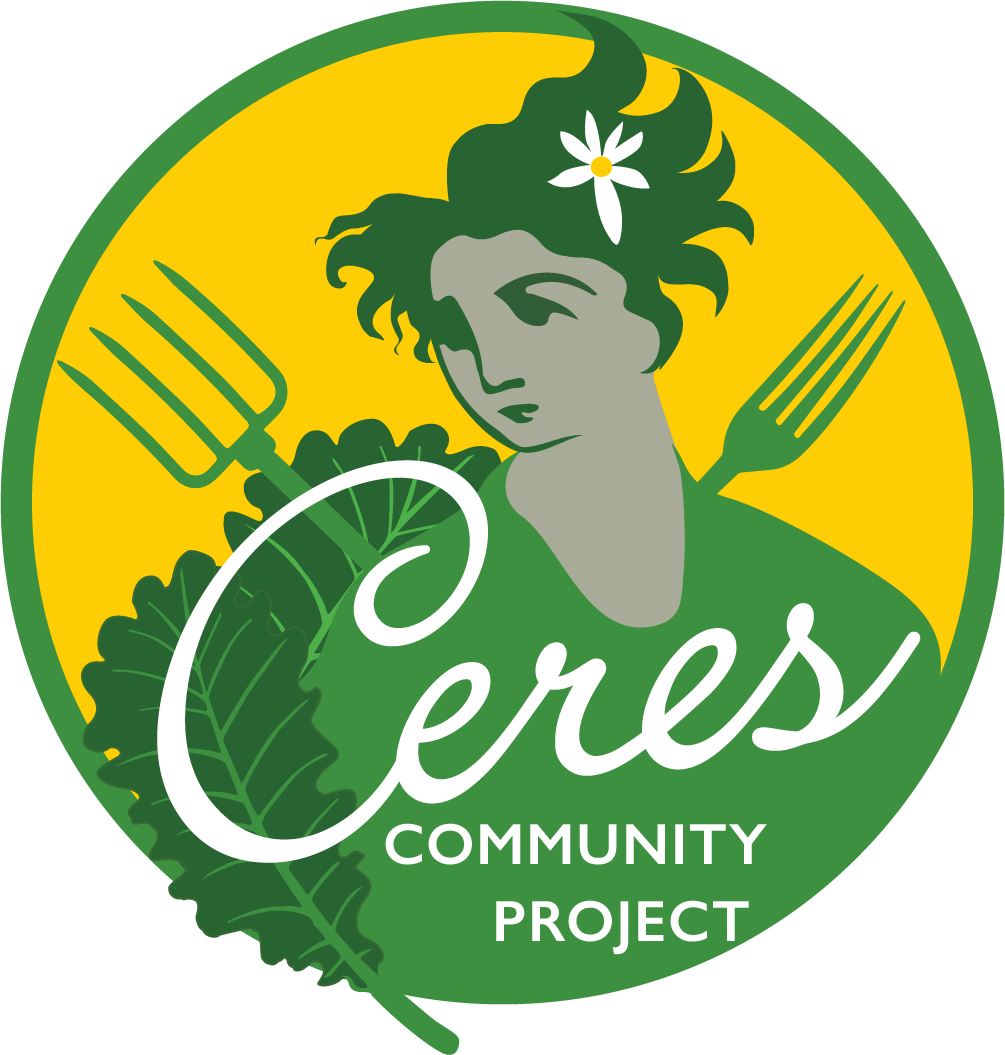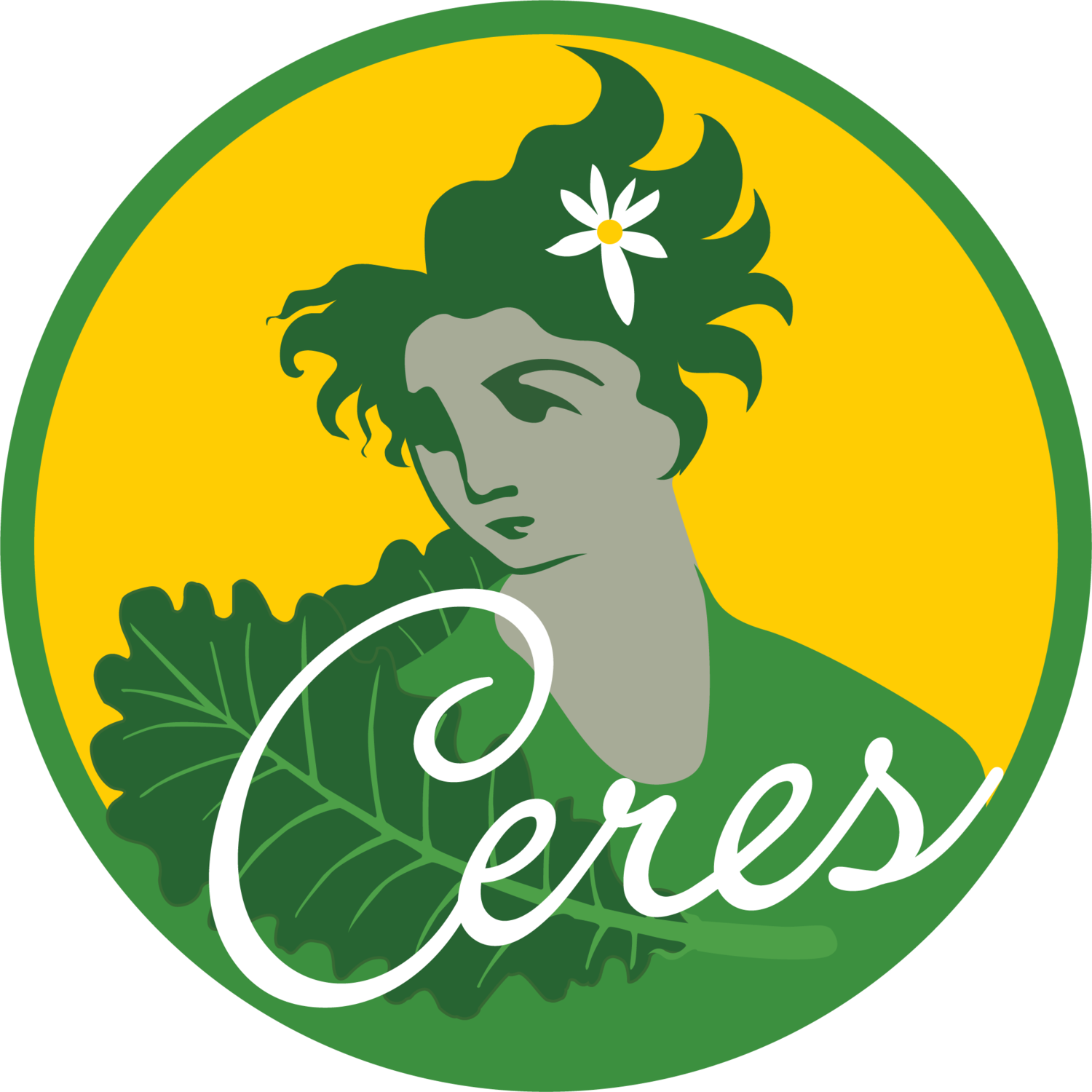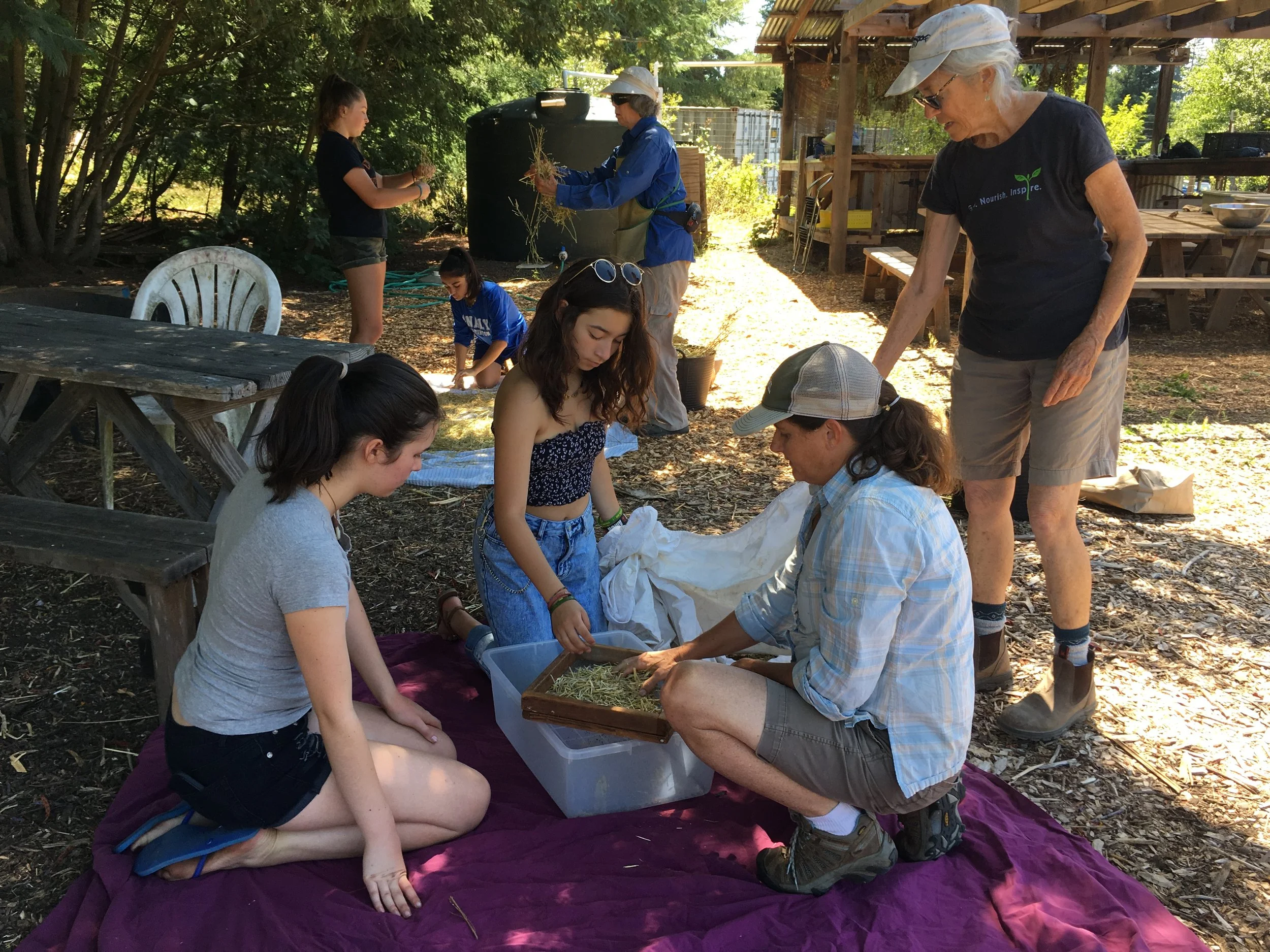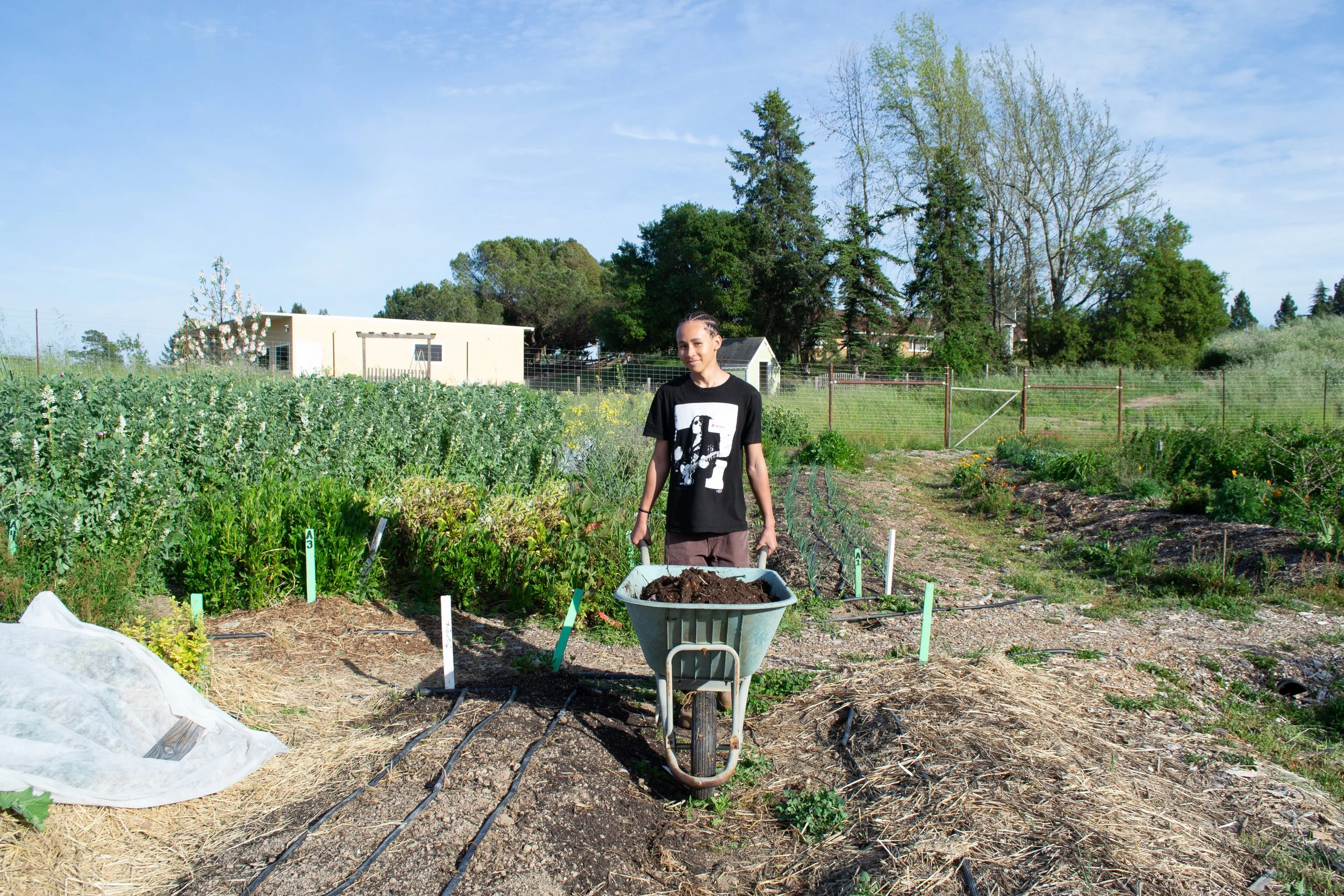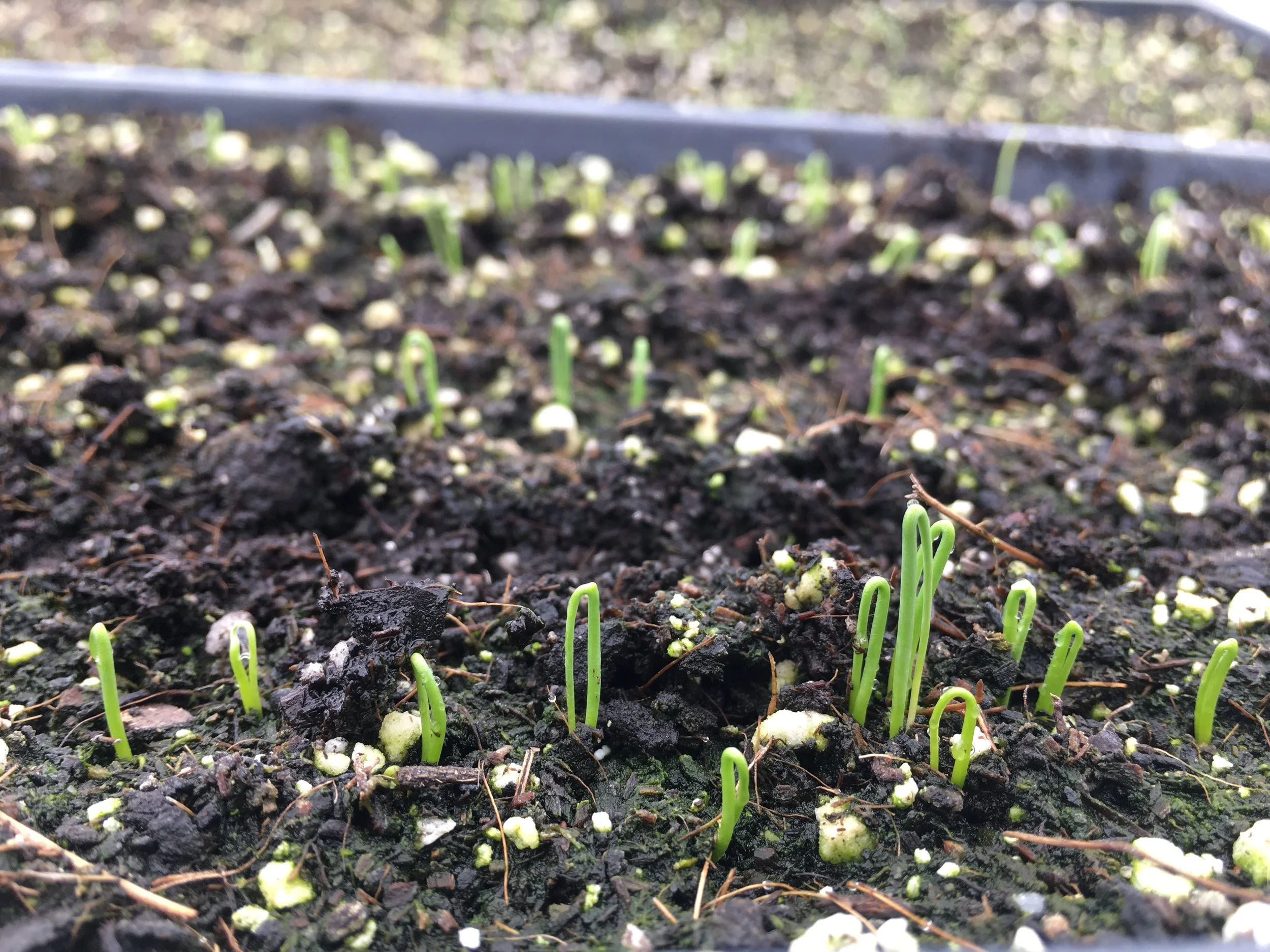Why Organic Gardens are Central to our Mission
A Nourishing Discourse
At Ceres Community Project we understand that people are not healthy in isolation. The social fabric of our lives, where we live, our access to healthy foods – all of these and many other factors shape and influence our ability to live a long, healthy and productive life. Our food system – how we grow and produce the food that we eat – is vital to that equation. It affects us individually, but it also impacts the health of our communities, the people who grow and process our food, and our environment and climate.
Sara McCamant, sitting on right, with youth in original Sebastopol Garden.
Thanks to the knowledge and leadership of Youth & Garden Program Manager Sara McCamant, we installed our first organic food production garden back in 2012. The goal was to grow food for Ceres’ clients and teach youth about where food comes from. Over the years, we’ve become increasingly aware of the power and connectedness of these food growing spaces – and our work to promote sustainable food systems – as core to our mission at Ceres.
Teen Gardener at Sebastopol Garden.
Our 1.5 acre youth-run garden at the Sebastopol Charter School gives youth a direct experience of where their food comes from, produces more than 6,000 pounds of organic produce for our client meals, and helps model our commitment to organic and regenerative food systems. Ceres is also the only medically tailored meal program in the country committed to using 100% organic food. Finally, supporting organic and sustainable food systems is a big focus of our policy work, including promoting food quality standards within the growing food as medicine movement.
How we Grow Food is Central to our Vision & Mission
Our vision at Ceres is a “healthy, caring, just and sustainable future” and our mission is “to create health for people, communities and the planet through love, healing food and empowering the next generation. Over the past seventeen years, we’ve developed a holistic and integrated approach to our work built on these core ideas:
Food matters for our health.
All people deserve access to healthy, affordable food.
Understanding where food comes from, how to grow and cook healthy food, and how to eat for health builds agency over our own health and well-being.
Youth are key participants and leaders in creating our collective future.
How we grow food impacts the nutritional value of that food, and also the health of food and farm workers, our environment, climate change and much more.
Strong social connections, feeling cared for, believing that you matter, and having a purpose are all essential to our health as individuals and our health as a community. Food is a powerful way to convey that experience.
These core ideas are at the heart of four areas of our work locally that braid together to engage, connect, educate and empower our community to create health for themselves, for one another and for our planet.
Client Medically Tailored Food & Nutrition Education – Access to and education about healthy eating for community members living with serious, complex and chronic health conditions to improve their quality of life and health outcomes while reducing health care utilization and costs.
Youth Development – Supporting youth in understanding the power of their food choices and how to grow, cook and eat for health while gaining life, work and leadership skills and experiencing their power as contributing members of the community.
Garden Program & Support for Organic Food Systems – Modeling organic and regenerative food growing practices and providing opportunities for clients, youth, adult volunteers and community members to learn about where their food comes from and how to grow food in a way that supports people and the planet; advancing organic and regenerative food systems through policy and advocacy.
Adult Volunteers – Engaging adults of all ages and from all walks of life; strengthening social connections, building skills, learning about nutrition and health, and providing opportunities for purpose and contribution.
A New Garden & Policy Priorities
We are excited to announce the launch of a new 1.5-acre food production garden in Petaluma! Ceres Community Project at Live Oak Farm Petaluma will be coming online over the next few months thanks to Garden Coordinator Noah Wolf-Prusan (above) who joined our team in March. We expect to begin with both youth and adult shifts during the summer, and multiple after school youth shifts beginning Fall 2024. This new garden location will allow us to grow significantly more food for our clients and expand participation in our Youth Development Program.
On the policy front, we are actively working to advance organic/regenerative food systems and what are called “values-based purchasing” policies. Here are just a few examples of work we’re engaged in:
Ceres is a member of the Federal Good Food Purchasing Coalition. This group is working to establish values-based purchasing guidelines for all federal agencies, and is supporting the EFFECTIVE Food Procurement Act, a bill that would require the US Department of Agriculture, which purchases billions of dollars in food products each year, to shift to a values based purchasing approach.
Through the California Food & Farming Network, we are supporting a 2024 bond measure that would create more inclusive access to healthy food, build support for organic farmers and work to bring together issues that impact people, farming and the climate.
In 2023 Ceres CEO Cathryn convened a group of state policy leaders to explore the potential to link California’s new Medically Supportive Food & Nutrition “Community Support” service with California’s goal to double organic food production by 2045. The intention is to create a policy framework that would reimburse providers like Ceres at a higher rate if we are purchasing California grown organic food.
What we eat is vital for our individual health, but how we grow food ripples out to impact many people’s health. By elevating our work around organic/regenerative food systems – through our gardens and our policy work – we hope to create even more positive impact for all the people we care about and serve, for our communities and for our world.
What is Organic/Regenerative?
Sprouts in the Sebastopol Garden.
While not “certified,” Ceres Community Project’s gardens use a combination of practices that are referred to as “organic/regenerative”. What do we mean by “organic/regenerative”? Organic has been defined since 2002 when the National Organic Program was implemented under the US Department of Agriculture. The organic standard includes improving the health of soil and the larger ecosystem, prohibits the use of synthetic pesticides and fertilizers, and protects animal welfare. You can read more about what organic means here: What is Organic.pdf (ccof.org)
As farmers have grown in their understanding of the potential benefits and consequences of food growing practices, there has been a movement to build on the important standards established in the National Organic Program. For example, Regenerative Organic Certified (https://regenorganic.org/) is a new certification that includes the organic certification but adds criteria for soil health, animal welfare and social fairness.
There is currently no one definition of “regenerative” but the California Department of Agriculture is currently working to develop one that would be used in California. One issue of concern is that Organic is currently the only certification that prevents the use of synthetic pesticides. We believe that any definition of regenerative should start with the current organic standard as the baseline.
Ways to Learn More:
Learn more about a potential bond measure to support California’s food and farm system: https://resilientfoodsystem.org/
Learn more about CCOF’s Road Map to Organic on their website: https://www.ccof.org/advocacy/roadmap-to-organic-california/
